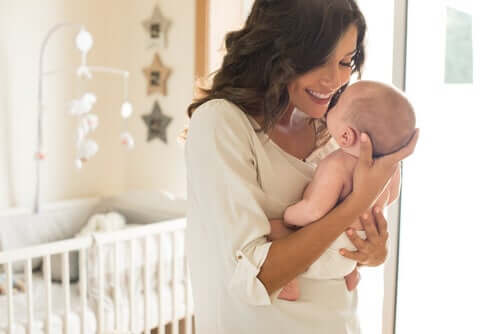Why Do Babies Cry?

Crying in babies is a topic that worries parents a lot, especially because it’s so common. The big question is: why do babies cry?
Although we want a single answer, the truth is that babies can cry for different reasons. They might be hungry, hot or cold, are uncomfortable, or need a diaper change, etc. In addition, they might be scared, or sometimes they just want to cry.
Also, it’s very common for babies to cry when you put them in their crib. When you pick your baby up to feed him, he might calm down, but then cry when he goes back to bed. Usually, this is when parents call the pediatrician for the first time:
- Doctor, something is wrong with my baby! Is he hungry or in pain?
- Why?
- Because he falls asleep on my chest, and when I put him to bed he starts crying. I put him back on my chest and he falls back asleep, and this happens all night.
In reality, the baby has no problems. He just doesn’t want to sleep in his crib! Next, we’ll explain why babies cry.

The first days when babies cry
Babies are in their mother’s womb for nine months, contained, floating in warm liquid, without being hungry, thirsty, hot or cold. Also, they always hear their mother’s voice and heartbeat.
Suddenly, without asking their permission, we take them out, and they start to feel hot cold, hungry, etc. Then, when you put them in the crib on hard or wrinkled sheets, they don’t recognize this new place. They don’t like it, so they cry.
Now, when you hold your baby, he feels like how he did in the womb and he clams down. This does NOT mean that you’re spoiling him, but simply that you can differentiate wellbeing from displeasure.
The first three months of a newborn’s life are governed by the pleasure principle. If they’re happy, they can eat sleep, mature, develop and grow. On the other hand, when newborns are unhappy, they can’t take it and they cry.
Crying babies under three months old can’t change their situation and will keep crying until their caregiver makes it better.
Newborn babies are the most handicapped animal in nature. For example, newborn giraffes fall 6 feet and run so predators can’t catch them. Compare that to human babies! They are 100% dependent on their parents.
During the first few months of life, the pleasure principle teaches us about needs and preferences:
- What makes babies happy? Everything they know.
- What makes babies unhappy? Everything they don’t know.
Being in mom’s arms is the closest thing to being in the womb. Here, babies feel warm, contained, rocked and cared for.

What if he gets spoiled?
Spoiling your baby is a complex intellectual association. It consists of thinking: If I cry, they will hold me, which I like, so: I will cry more.
If a baby under the age of three months cries, you should hold him. In fact, studies show that the longer you let him cry, the longer he will cry.
Babies under three months old don’t have the mental capacity to be spoiled. If they cry, you should hold them.
Babies don’t get used to new or unfamiliar situations by crying, but they do after having been in that situation many times, calm and accompanied. In fact, this happens naturally. So, your baby will stop crying in the crib when he recognizes it. He will recognize it after lying in it distracted for many times in a row.
Warning: the technique of letting babies cry until they “get over it” doesn’t work well. Not only will they not calm down, but it might actually make babies hate their crib.
Lastly, it’s important to keep in mind that what Sigmund Freud described as the pleasure principle, parenting experts today call it exterogestation, the second pregnancy or external pregnancy.
For this reason, you should treat newborns as if they’re still in the womb. Give them as much physical contact as possible, love, warmth, care, and feeding on demand.
Crying in babies is a topic that worries parents a lot, especially because it’s so common. The big question is: why do babies cry?
Although we want a single answer, the truth is that babies can cry for different reasons. They might be hungry, hot or cold, are uncomfortable, or need a diaper change, etc. In addition, they might be scared, or sometimes they just want to cry.
Also, it’s very common for babies to cry when you put them in their crib. When you pick your baby up to feed him, he might calm down, but then cry when he goes back to bed. Usually, this is when parents call the pediatrician for the first time:
- Doctor, something is wrong with my baby! Is he hungry or in pain?
- Why?
- Because he falls asleep on my chest, and when I put him to bed he starts crying. I put him back on my chest and he falls back asleep, and this happens all night.
In reality, the baby has no problems. He just doesn’t want to sleep in his crib! Next, we’ll explain why babies cry.

The first days when babies cry
Babies are in their mother’s womb for nine months, contained, floating in warm liquid, without being hungry, thirsty, hot or cold. Also, they always hear their mother’s voice and heartbeat.
Suddenly, without asking their permission, we take them out, and they start to feel hot cold, hungry, etc. Then, when you put them in the crib on hard or wrinkled sheets, they don’t recognize this new place. They don’t like it, so they cry.
Now, when you hold your baby, he feels like how he did in the womb and he clams down. This does NOT mean that you’re spoiling him, but simply that you can differentiate wellbeing from displeasure.
The first three months of a newborn’s life are governed by the pleasure principle. If they’re happy, they can eat sleep, mature, develop and grow. On the other hand, when newborns are unhappy, they can’t take it and they cry.
Crying babies under three months old can’t change their situation and will keep crying until their caregiver makes it better.
Newborn babies are the most handicapped animal in nature. For example, newborn giraffes fall 6 feet and run so predators can’t catch them. Compare that to human babies! They are 100% dependent on their parents.
During the first few months of life, the pleasure principle teaches us about needs and preferences:
- What makes babies happy? Everything they know.
- What makes babies unhappy? Everything they don’t know.
Being in mom’s arms is the closest thing to being in the womb. Here, babies feel warm, contained, rocked and cared for.

What if he gets spoiled?
Spoiling your baby is a complex intellectual association. It consists of thinking: If I cry, they will hold me, which I like, so: I will cry more.
If a baby under the age of three months cries, you should hold him. In fact, studies show that the longer you let him cry, the longer he will cry.
Babies under three months old don’t have the mental capacity to be spoiled. If they cry, you should hold them.
Babies don’t get used to new or unfamiliar situations by crying, but they do after having been in that situation many times, calm and accompanied. In fact, this happens naturally. So, your baby will stop crying in the crib when he recognizes it. He will recognize it after lying in it distracted for many times in a row.
Warning: the technique of letting babies cry until they “get over it” doesn’t work well. Not only will they not calm down, but it might actually make babies hate their crib.
Lastly, it’s important to keep in mind that what Sigmund Freud described as the pleasure principle, parenting experts today call it exterogestation, the second pregnancy or external pregnancy.
For this reason, you should treat newborns as if they’re still in the womb. Give them as much physical contact as possible, love, warmth, care, and feeding on demand.
All cited sources were thoroughly reviewed by our team to ensure their quality, reliability, currency, and validity. The bibliography of this article was considered reliable and of academic or scientific accuracy.
- Colmenares, D. (2019, mayo 6). ¿Qué es la exterogestación? Recuperado abril de 2020, de https://mejorconsalud.as.com/que-es-exterogestacion/
- Martínez, R. (2019, agosto 5). El amor en los bebés es el mejor estímulo para formar vínculos afectivos. Recuperado abril de 2020, de https://lamenteesmaravillosa.com/el-amor-en-los-bebes-es-el-mejor-estimulo-para-formar-vinculos-afectivos/
This text is provided for informational purposes only and does not replace consultation with a professional. If in doubt, consult your specialist.








